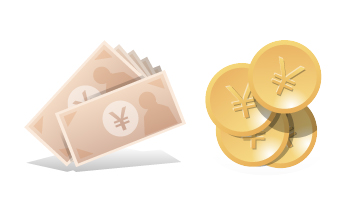General Living Information
Currency

The currency of Japan is the yen (¥).
Notes come in four denominations of 10,000, 5,000, 2,000 and 1,000 yen. Coins come in six denominations of 500, 100, 50, 10, 5, and 1 yen.
Use of cash is common in Japan, however many stores will also accept credit and debit cards.
Climate and weather in Tokyo
Tokyo has four distinct seasons of spring, summer, autumn and winter. The average temperatures are as follows.

Cost of living
The consumption tax in Japan increased to 10% on the 1st of October 2019. The following outlines prices for the main daily necessities.
| Goods | Units | Average Price |
|---|---|---|
| Rice (blended rice) | 5kg | \2,650 |
| Bread | 1kg | \511 |
| Milk | 1 liter | \253 |
| Eggs | 10-pack | \264 |
| Apples | 1kg | \1,039 |
| Cabbage | 1kg | \178 |
| Carbonated beverage | 1 liter | \236 |
| Hamburger | 1 | \233 |
| Toilet paper | 1,000m | \799 |
| Haircut | 1 month | \3,737 |
| Taxi | 4km |
\1,693 |
Reference: Portal Site of Official Statistics of Japan (Retail Price Survey of August 2024)
National holidays
In Japan, schools and government offices generally close on Saturdays, Sundays, and public holidays. Financial institutions also follow this rule. Medical institutions observe various business holidays, so be sure to look into the consultation days and times for your neighboring hospitals and other medical centers so that you are prepared in case of sudden illness or injury.
| National holidays | Dates |
|---|---|
| New Year's Day | January 1 |
| Coming of Age Day | Second Monday of January |
| National Foundation Day | February 11 |
| Emperor's Birthday | February 23 |
| Spring Equinox | Around March 20 |
| Showa Day | April 29 |
| Constitution Memorial Day | May 3 |
| Greenery Day | May 4 |
| Children's Day | May 5 |
| Sea Day | Third Monday of July |
| Mountain Day | August 11 |
| Respect for the Aged Day | Third Monday of September |
| Autumn Equinox | Around September 23 |
| Sports Day | Second Monday of October |
| Culture Day | November 3 |
| Labor Thanksgiving Day | November 23 |
Public transportation
Public transportation in Tokyo is highly developed, with buses and trains running on fixed timetables from early morning to late night.
PASMO/SUICA
These cards, used for public transport and electronic money, are sold at the green ticket window in train stations, and at card vending machines and kiosks. Pasmo/Suica commuter passes are also available.
Student discount commuter rail passes
Because Akamonkai is an educational corporation, students at the school on student visas can purchase student discount commuter rail passes. You can purchase discount passes for the train route between the closest station to your residence and the stations near the school (Nippori, Nishi-Nippori or Mikawashima stations).
Bicycles
The most convenient way to commute from school dormitories is by bicycle, with many students buying a bicycle as soon as they arrive. When you buy a bicycle, make sure to register it using the bicycle registry (¥500).
Do not ride unattended bicycles or bicycles that are not registered under your name. When taking over the possession of a friend's bicycle, be sure to receive a receipt, and take both the bicycle and the receipt to a bicycle shop to have the ownership of the bicycle changed into your name.
Utilities fee
Students staying in dormitories should obey the dormitory teachers, and pay their share of the utility charges.
Public manners
Method for disposal and collection of waste varies from city to city, but every area has a set date and place for the collection of different types of waste. You may also only smoke in designated areas.
Be sure to always follow the set rules and manners.
Disaster preparedness
Japan is one of the most earthquake prone countries in the world. Be sure to always be prepared in case of an emergency.
Fundamental rules of conduct in case of fire, earthquakes, or other disasters are detailed below. Read them carefully, and always remain highly aware of what to do in times of emergency.
Three principles in case of fire
- Extinguish the fire quickly: Attempt to put out the fire quickly with a nearby extinguisher or indoor fire hydrant. This is only for fires that have not reached the ceiling, otherwise please evacuate.
- Dial 119: Immediately call 119, even if the fire is small. Report your location accurately without panicking.
- Lead evacuation: Use a broadcast system or a loud voice to guide others to evacuate. Human life comes first.
Three principles in case of earthquake
- Secure personal safety: Ensure your personal safety by hiding in a secure place such as under a desk.
- Extinguish fire: Immediately put out any fires being used in the vicinity. If a fire breaks out, take early fire-fighting measures (fire extinguisher/fire hydrant/calling 119).
- Aid and rescue: Look for, and aid any injured persons around you. Shout to confirm the safety of yourself and others. Treat injuries, or call an ambulance for serious injuries.
Entering the country
Items needed when arriving include your passport, visa, confirmation of enrollment at the school, money, and any usual medicine.
Looking up the way to the school from the airport in advance makes for a smoother arrival.
Please refer to the directions to the school available on the access page.
> Access
We can meet students moving into the dorms who are arriving at Nippori station.
About admission procedure
